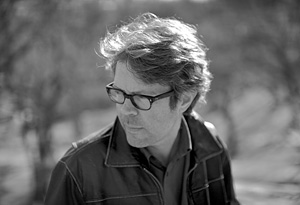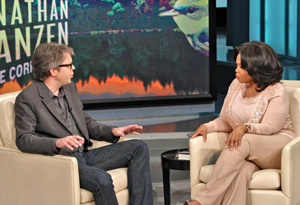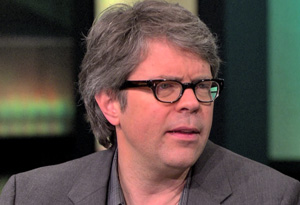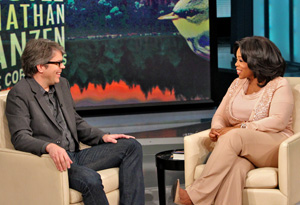The Franzen Phenomenon

Jonathan Franzen © Greg Martin
In 2001, Jonathan Franzen's book The Corrections—a comic and tragic story about a family breaking down in an age of easy fixes—dazzled critics and readers alike. It became a best-seller, a National Book Award winner, a Pulitzer Prize finalist and an Oprah's Book Club pick.
Fans waited nine years for Jonathan's next novel, and in 2010, they were rewarded with Freedom. In Freedom, Jonathan returns to fiction with another funny-sad story. This time, Jonathan introduces us to the Berglunds, a Midwestern couple slowly drifting apart as the years go by.
The debut of Freedom has been met with unbridled enthusiasm. Readers have pushed it to the top of the charts, Time magazine is calling Jonathan a great American novelist and even President Barack Obama is a fan. And, once again, Jonathan's work has caught the attention of Oprah: In September 2010, she made it her latest book club pick.
Fans waited nine years for Jonathan's next novel, and in 2010, they were rewarded with Freedom. In Freedom, Jonathan returns to fiction with another funny-sad story. This time, Jonathan introduces us to the Berglunds, a Midwestern couple slowly drifting apart as the years go by.
The debut of Freedom has been met with unbridled enthusiasm. Readers have pushed it to the top of the charts, Time magazine is calling Jonathan a great American novelist and even President Barack Obama is a fan. And, once again, Jonathan's work has caught the attention of Oprah: In September 2010, she made it her latest book club pick.

It's no secret that Jonathan and Oprah have had a little history together. When Oprah picked his novel The Corrections for her book club in 2001, Jonathan voiced some concerns in the press. The book still went on to be an Oprah's Book Club selection, but Jonathan and Oprah never sat down to discuss the book and Jonathan never appeared on her show.
Oprah: What do you think happened?
Jonathan: It's a long time ago.
Oprah: Yes.
Jonathan: One can be forgiven for forgetting. One could be encouraged to forget. You know, I spoke in very long sentences. And then little pieces of the sentences sounded bad, and your feelings were probably understandably hurt. Next thing we knew, it had become this thing. And I think it was probably the right decision to just let everything cool down.
Oprah: Were you surprised by the media velocity?
Jonathan: Yes. Totally. It was probably the big thing I learned from the experience, which was to have more respect for television. Writers I think resent, they fear, they envy television because it's so powerful and omnipresent. I think you don't respect the power that it has, and then you don't figure out how to communicate. In a televised age, you talk like a writer, but things are happening at this kind of TV velocity.
Oprah: But I have to tell you, the reason I had to go back and read the press clips is because I was thinking: "Did I cancel the book club? I don't think I did." What I actually said was, "All right, if you were uncomfortable..." and the impression at the time was that you were being a snob.
Jonathan: Right.
Oprah: That's the impression most people got. And was that true or not?
Jonathan: I am a Midwestern egalitarian. I do not think of myself as a snob. My idea of the book I want to write, the book I want to read, is one that everybody can find a way to connect to. That's really what I've devoted my career to.
Oprah: That's what you do.
Jonathan: Exactly. But the problem is in the accelerated media scape, if you say, "I don't want to scare away male readers," that comes through as "Franzen can't stand women readers." ... When you have a polarized cultural environment too, the two things go together very quickly to hero/villain sort of polarity.
Oprah: You know they're looking for whatever they can.
Jonathan: Exactly.
Oprah: Well, the bottom line is I'm happy to have you.
Jonathan: I'm happy to be here.
Oprah: What do you think happened?
Jonathan: It's a long time ago.
Oprah: Yes.
Jonathan: One can be forgiven for forgetting. One could be encouraged to forget. You know, I spoke in very long sentences. And then little pieces of the sentences sounded bad, and your feelings were probably understandably hurt. Next thing we knew, it had become this thing. And I think it was probably the right decision to just let everything cool down.
Oprah: Were you surprised by the media velocity?
Jonathan: Yes. Totally. It was probably the big thing I learned from the experience, which was to have more respect for television. Writers I think resent, they fear, they envy television because it's so powerful and omnipresent. I think you don't respect the power that it has, and then you don't figure out how to communicate. In a televised age, you talk like a writer, but things are happening at this kind of TV velocity.
Oprah: But I have to tell you, the reason I had to go back and read the press clips is because I was thinking: "Did I cancel the book club? I don't think I did." What I actually said was, "All right, if you were uncomfortable..." and the impression at the time was that you were being a snob.
Jonathan: Right.
Oprah: That's the impression most people got. And was that true or not?
Jonathan: I am a Midwestern egalitarian. I do not think of myself as a snob. My idea of the book I want to write, the book I want to read, is one that everybody can find a way to connect to. That's really what I've devoted my career to.
Oprah: That's what you do.
Jonathan: Exactly. But the problem is in the accelerated media scape, if you say, "I don't want to scare away male readers," that comes through as "Franzen can't stand women readers." ... When you have a polarized cultural environment too, the two things go together very quickly to hero/villain sort of polarity.
Oprah: You know they're looking for whatever they can.
Jonathan: Exactly.
Oprah: Well, the bottom line is I'm happy to have you.
Jonathan: I'm happy to be here.

Jonathan says his goal is to write books that can stand up to our "noisy" culture—that will "suck you away from all the distractions that we're bombarded with," he says. In order to do this, Jonathan says he has to isolate himself from those distractions as well. He says he does this by working in a dark, quiet office with no Internet and no telephone.
"And there I try to think about the things that make me most uncomfortable...and the things I most don't want to think about," he says. "I do that for years and make myself miserable, but also start to figure out what the real deep conflicts of myself are. And I have this theory that if I can figure out what's going on in myself and pay careful enough attention, it starts to maybe mirror what's going on in culture."
Oprah says she's impressed by the way Jonathan is able to understand the nuances of our culture—something he attributes to turning down the noise around him.
"I think we have about 100 times more noise than we need," Jonathan says. "If you get rid of 99 percent of it—so instead of dealing with a million things coming at you, you're only dealing with a thousand—you can actually pay attention to those thousand things. You can see them one at a time. And then what the novelist does is order a couple thousand things like that into some meaningful narrative."
"And there I try to think about the things that make me most uncomfortable...and the things I most don't want to think about," he says. "I do that for years and make myself miserable, but also start to figure out what the real deep conflicts of myself are. And I have this theory that if I can figure out what's going on in myself and pay careful enough attention, it starts to maybe mirror what's going on in culture."
Oprah says she's impressed by the way Jonathan is able to understand the nuances of our culture—something he attributes to turning down the noise around him.
"I think we have about 100 times more noise than we need," Jonathan says. "If you get rid of 99 percent of it—so instead of dealing with a million things coming at you, you're only dealing with a thousand—you can actually pay attention to those thousand things. You can see them one at a time. And then what the novelist does is order a couple thousand things like that into some meaningful narrative."

One observation that Jonathan has made about our culture is that we have more material possessions than ever before, and yet people seem more discontent and angrier than ever.
"It's a really striking paradox," Jonathan says. "The richest country in the history of the earth, and everybody is p.o.'d all the time. It doesn't really speak well for the ability of material success to bring happiness, does it?"
Want to know more? Watch Jonathan's entire book club discussion
Get everything you need to know about Freedom
"It's a really striking paradox," Jonathan says. "The richest country in the history of the earth, and everybody is p.o.'d all the time. It doesn't really speak well for the ability of material success to bring happiness, does it?"
Want to know more? Watch Jonathan's entire book club discussion
Get everything you need to know about Freedom



